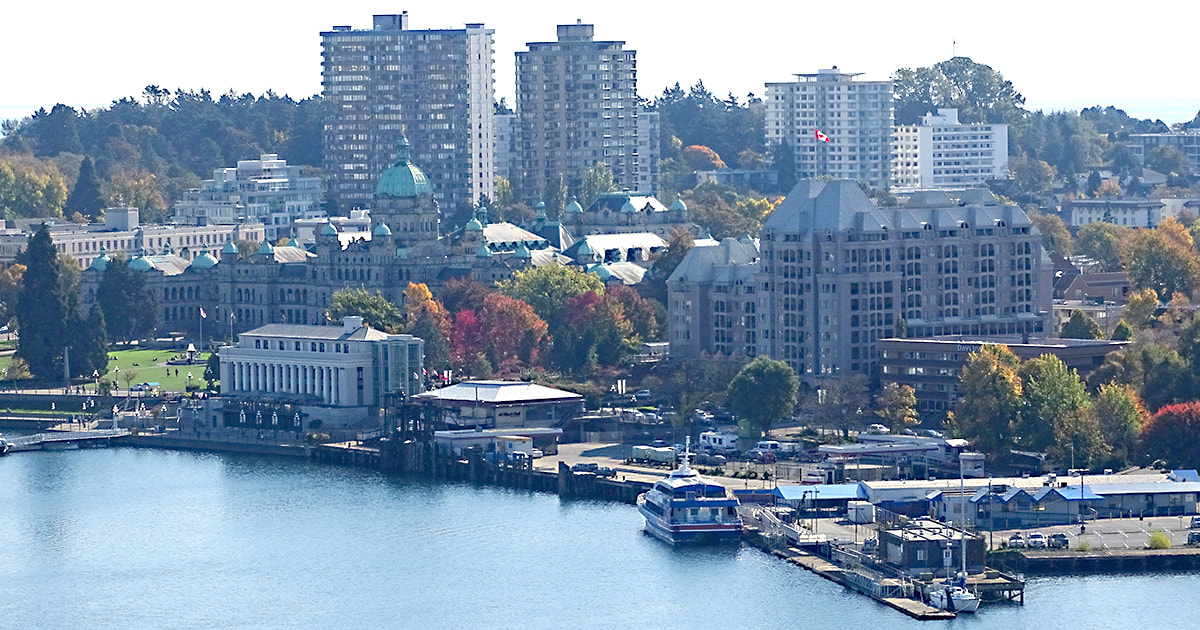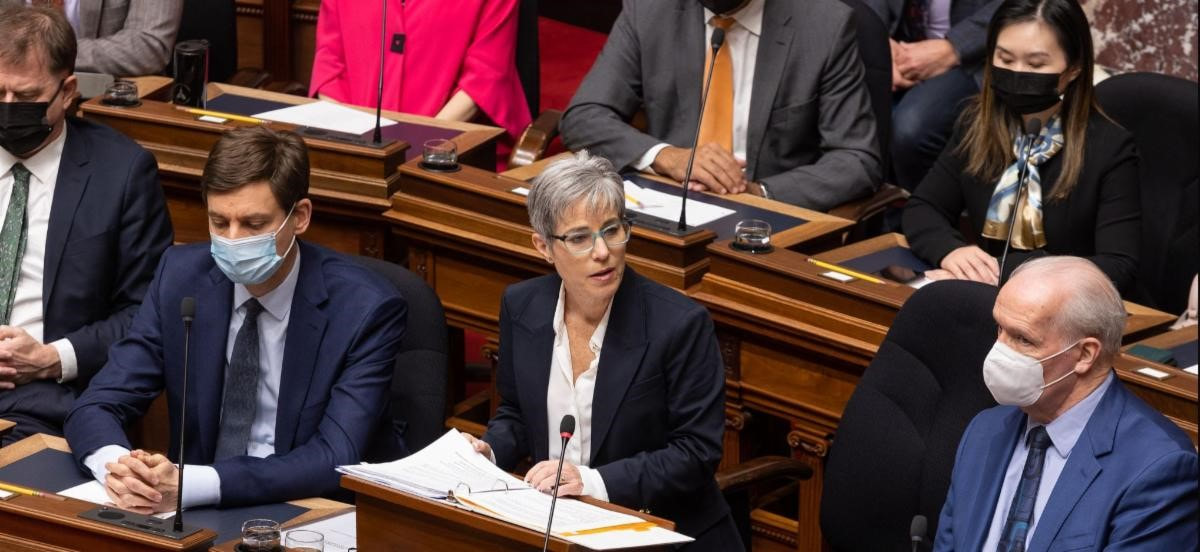|
British Columbia is not seeing a surge in people needing to be hospitalized due to respiratory illnesses, Provincial Health Officer Dr. Bonnie Henry said today.
Over the summer, there were concerns that the fall flu and cold season would see an increase in COVID-19 hospitalizations. So far, that has not happened. Dr. Henry said the current situation does not warrant a formal mask mandate. "While COVID-19 continues to circulate in communities, the situation has changed ... and the number of people at risk for serious outcomes from COVID-19 has dropped significantly," states the provincial news release. "There are many tools to get people through respiratory illness season. The most important is to maximize protection through vaccination. People are also encouraged to check daily for symptoms of respiratory illness, wash their hands regularly and practise respiratory etiquette. This includes wearing a mask if they have mild symptoms, covering coughs and disposing of tissues appropriately." Access to primary health care is an important element of safe communities. The Chamber applauds news that the provincial government is taking serious steps to retain existing family doctors and attract new ones to the province.
A new payment model will be available for family doctors starting in February. The deal will change how patients interact with their doctors, allowing for more focused visits. The current model has been criticized for emphasizing the number of patients seen per day rather than the quality of the visit. David Eby will be the next Premier after being formally named leader of the BC NDP. The transition from Premier John Horgan is expected to take place mid-November, and Eby has already said he intends to bring in a budget that will allow quick action on housing affordability, the climate and healthcare.
The Chamber looks forward to continuing to work with the provincial government on key issues affecting Greater Victoria. We're also calling on the province for better budget transparency, especially if new spending is planned. Last month, BC's Auditor General Michael Pickup raised concerns about the province's accounting methods. “Each year, my office is mandated to report whether government’s financial statements are fairly stated in accordance with generally accepted accounting principles,” Pickup is reported to have said. “My job is to report what I see (and) give the opinion that I believe. So I think these things should be corrected.” Chamber members have an opportunity to hear directly from BC's AG next month. Recent media reports about break-ins that seem to be targeting specific types of business are renewing calls for solutions to downtown crime.
"Businesses, of course, want to feel safe," Chamber CEO Bruce Williams told Global News. "They want to know that they themselves and their employees are safe when they come and go from work." Of course, the situation is complex. The toxic drug crisis continues to cause damage throughout society, and, particularly, with people involved in street life who are at risk of homelessness. Addictions, as well as mental health challenges, are often at the root of criminal behaviour that makes the news. Any solutions need to intersect with the healthcare system, which is why organizations such as Island Health are critical to have onboard. On Tuesday, The Chamber and Island Health hosted a gathering of about 40 people at the University Club at the University of Victoria. The discussion focused on how businesses and non-profit organizations can work with Island Health to develop innovative solutions to complex problems around mental health and addiction. Other topics included work being done to attract and retain more doctors, support workplace mental health and streamline health care delivery. It was a good opportunity to combine the nimbleness and creativity of the private sector with the resources and gravitas of the public health authority. The spirited discussion resulted in a number of ideas that The Chamber and our members will continue to follow up on in the months ahead. The legal sale of cannabis in BC continues to grow, potentially reducing the size of the black market. Statistics Canada's figures show that British Columbians spent $57.3 million on legal cannabis in July — the highest month yet recorded.
Since cannabis was legalized four years ago, statistics show one in five people report using the product over the past year. The Chamber supports fair rules for all businesses, and we believe that the community benefits from an industry operating with legal regulations that protect the public and provide certainty to businesses. The provincial government is increasing the threshold for the small business tax rate. The rate had been limited to businesses with less than $15 million in taxable capital. That is being increased to $50 million.
The changes will apply to taxation years that began on or after April 7 of this year. The shift aligns BC with the federal government and will particularity benefit businesses that are capital intensive. Businesses thrive on certainty. So, knowing the costs of delivery services is a major win for restaurants that have spent the last few years building up their home delivery business.
Early in the pandemic, the provincial government placed a temporary limit on how much food delivery companies can charge. Last week, the province said it was moving to make the change permanent. “Transforming the temporary delivery fee cap into a permanent model is a game changer for the recovery of our industry and setting restaurants up to be able to thrive in the future,” said Ian Tostenson, president and CEO, BC Restaurant and Foodservices Association in a news release. The 15% cap on food and 5% cap on additional fees was set to expire at the end of the year. The provincial government announced changes on Monday to the way certain property values are assessed. The move could potentially ease a burden faced by businesses whose property has been assessed based on its potential value. For example, a one-storey non-profit serving a downtown neighbourhood assessed as if it housed a high-rise condo resulted in massive unsustainable property tax increases.
The Chamber advocates for Fair Regulations, and we were successful in getting the province to review BC Assessment's "highest and best use" practice. The changes announced this week will allow municipalities to choose lower tax rates for select properties. Last week's news that the provincial government is making child care more affordable is a step in the right direction. The Chamber has long advocated for accessible and affordable child care as a vital investment in our economy.
On Friday, the province announced that parents can expect to save as much as $550 in child care costs every month. The new funding will go directly to licensed child care centres so parents don't have to apply. The savings will take effect in December, and help families with children who are kindergarten-aged or younger. The savings build on earlier cuts to costs and are funded by the federal governments $3.2 billion agreement with BC. Examples of how the program will help families and allow more parents to continue their careers include:
The Chamber applauds the provincial government's initiative to seek public input on plans to rejuvenate Belleville Terminal.
The facility in the Inner Harbour has served as a gateway for international visitors arriving by water since 1924. As a champion of our region's tourism industry, The Chamber has consistently advocated for the terminal and the need to modernize it with the times. "We've been calling for renovations for decades, and it's taken time to get all levels of government onboard," Chamber CEO Bruce Williams said. "Now that we've done that, there's no time to lose. The requirements to be a border crossing have changed and there's a real risk we could lose our port of entry." More than 680,000 passengers travelled through Belleville Terminal in 2019 and spent about $174 million in Greater Victoria, says the province's project plan. Belleville Terminal generates 220,000 overnight visitors and sells over 16,000 vacation packages annually to their passengers, all of which are provided by local businesses in Victoria. The province is developing a business case for the project. It's expected to cost up to $290 million and be completed by fall 2027. A temporary terminal will be built until a new facility is ready. BC is back in the black as the province is reporting a $1.3 billion surplus for the 2021-22 fiscal year. The economy outperformed most forecasts that were expecting deficits for years to come as businesses recover from the pandemic.
“While others might have chosen cuts and austerity, our investments in people have helped our economy rebound faster than anyone in the public or private sector predicted," BC Finance Minister Selina Robinson said. "Looking ahead, the Province will keep using this economic strength to support British Columbians, including bringing in new measures in September to help those who are struggling the most with global inflation.” The Canadian economy was also up, with national GDP rising by 3.3% in the second quarter. The jump is the largest since 1974. The increase was driven by strong consumer spending and investments by businesses, Statistics Canada said. Housing supply is critical in order to address the highest expense directly affecting the cost of living in our region and across Canada. With demand growing due to increases to our population, the challenge of our time is to ensure homes are accessible and affordable for everyone needed to help our community prosper.
"It's fundamental economics. A limited supply results in increased demand, which tends to increase costs," Chamber CEO Bruce Williams said. "We need a concerted effort from all levels of government to support builders who need an adequate workforce as well as access to materials and land needed to build more homes." Some progress is being made. Canada Mortgage and Housing Corp. recently reported that urban housing starts increased in July compared to June. “Historically elevated levels of housing starts activity continue in Canada, which have been well above 200,000 units since 2020,” said Aled Ab Iorwerth, CMHC's Deputy Chief Economist. The Chamber has long called for a renewed approach to policing in Greater Victoria in order to ensure resources are available where they're most needed.
A decision by the Township of Esquimalt to not renew a 10-year agreement with the City of Victoria to share policing costs creates an opportunity for the provincial government to look at a regional police force. "Perhaps this might be an opportunity to make major structural changes in the makeup of the police departments here in the south Island,” VicPD police chief Del Manak told the Times Colonist. A report released this spring by the province from the Special Committee on Reforming the Police Act suggested that a regional police force is past due. The report stated that, when the provincial government ordered the merger of the Esquimalt and Victoria police forces in 2002, the understanding at the time was that "this would be the first step towards regional integration of policing in the Capital Region, but this has not happened." It's a familiar story that has the statistics to back it up. Greater Victoria as a region is one of the safest places in Canada, but the downtown core in the City of Victoria faces challenges that require urgent attention.
A report released this week by Statistics Canada shows Greater Victoria has a Crime Severity Index of 71.5, which is less than the national average. However, there is a huge discrepancy between municipalities. With a CSI of 148, Victoria is an outlier compared to the region's other municipalities. “If there’s any region that could benefit from amalgamation or a regional police force, it would be the Capital Regional District, given that we have the makeup of so many smaller agencies and the Victoria Police Department is carrying the lion’s share of the workload,” VicPD police Chief Del Manak told the Times Colonist. The Chamber continues to call for Better Regional Services and Safe Communities as fundamental requirements for building good business and great community for all. The Chamber has been effective in our work to keep lines of communication clear between government and the business community. BC's Attorney General David Eby responded to a letter by The Chamber, co-signed by the Surrey Board of Trade and the Alberni Valley and Campbell River and District chambers of commerce.
"We were clear that the Lobbyists Transparency Act as implemented is missing its intended mark," Chamber CEO Bruce Williams said. "We support open and transparent government but this is red tape that is casting a chill on many small chambers due to its heavy handed reporting requirements. Threats of fines and public shaming aimed at preventing conflicts of interest are causing collateral damage to non-profits working for the benefit of communities. This flies in the face of the work that chambers do to build connections that enable informed decisions and successful policies." The Chamber will continue to work with the AG to refine the LTA to better achieve its intended outcomes. Concerns over inflation and the resulting increase in interest rates sparked by the Bank of Canada have worked to cool down housing sales in our region. The Victoria Real Estate Board's latest statistical analysis shows 35% fewer homes were sold in June compared to the same month last year. There are more listings on the market allowing it to settle into a more typical pace than the frenzied conditions experienced during the pandemic.
However, the benchmark value for homes continued to increase to $1,464,400 in June from $1,446,400 in May. "It may seem counterintuitive to continue to talk about the need for supply at a time when inventory is rising," VREB President Dinnie-Smyth said in a news release. "We must keep the conversation alive, and we urge all levels of government to continue to aggressively address the housing supply situation. We need more supply of all types of housing." A lack of housing supply is a major factor in the challenge many employers face finding and keeping workers. “We are always advocating for more affordable housing and housing supply, as well as security and sustainability in supply chains to get the needed materials in place to create housing,” Chamber CEO Bruce Williams told the Times Colonist. Starting Canada Day, the provincial government will require "marketplace facilitators" charge the PST for the purchase of certain online good and services.
BC defines a marketplace facilitator as a person who:
Businesses with annual sales of less than $10,000 are exempt. The Greater Victoria Chamber of Commerce added our voice to calls from the Surrey Board of Trade, Alberni Valley Chamber of Commerce and Campbell River & District Chamber of Commerce to rethink new rules that are casting a chill on the traditional role of business as a trusted voice for decision makers. The new rules require communication with government officials to be logged monthly using a multi-step process.
“Chambers of commerce and boards of trade are embedded in the fabric of our communities," Chamber CEO Bruce Williams said. "Our mandate is to give voice to business. In healthy communities, the public sector and private sector co-exist in a balance that creates employment and healthy economies and enables sound policies. This isn’t new, but it is being threatened by onerous requirements that miss their target. We are putting historic relationships at risk with this paternalistic red tape that is effectively censuring important conversations.” The organizations co-authored a letter to Attorney General David Eby requesting that chambers and boards of trade be exempt from the BC Lobbyists Transparency Act. In 2020, significant changes to BC’s lobbyist registration regime came into effect creating confusion and concern for every business or organization whose role includes communicating with BC government officials. Read the letter here: Letter: Re: Exempting Chambers and Boards of Trade from BC Lobbyists Transparency Act An initiative that started in the City of Victoria, was supported by business and took root across Greater Victoria is moving to the national stage. As of the end of this year, the federal government is banning the production or importation of single-use plastic bags, straws, stir sticks containers and other items that clog up landfills and contaminate natural ecosystems.
The Chamber worked closely with local governments on the initial regulations to ensure government followed innovations already being introduced by business. This helped the implementation unfold smoothly as the rules were a response to public demand as identified by businesses, ensuring success. The best way to address the seriousness of climate change is by supporting innovations led by business. As Chair of the Council of the Federation, BC Premier John Horgan will host his counterparts from across the country in Victoria on July 11-12.
Premiers from every province and territory in Canada are expected to debate in style at the Fairmont Empress. The premiers will discuss national issues, including a call for the federal government to increase health care funding. “Canada’s public health-care system began as a 50/50 partnership, but the federal government’s contribution has shrunk to just 22%," Horgan said in a news release. "This is not sustainable for our health-care system and we cannot afford to wait. Today, I renew my call to the federal government to provide their fair share and cover 35% of the costs." The Chamber is meeting with the Select Standing Committee on Finance and Government Services on Monday to offer guidance on the next provincial budget.
Chambers have a long history of being the effective voice of business in their communities. We've worked hard to earn the trust of decision makers as we advocate to make a real difference in policies that help business thrive. "I'm available to our members any time they want to reach out and discuss concerns or seek support," Chamber CEO Bruce Williams said. "We don't always see eye to eye with government officials but we're always respectful and do the work needed to show why policies need to be implemented or changed. A robust and vibrant economy is good for business and everyone in our community." Individuals can also share their views with the committee by filling out an online survey or sending in written comments by 3 pm, June 24. BC Minister of Finance Selina Robinson met with Greater Victoria Chamber of Commerce members today to address your questions about the province's 2022 Budget, unveiled yesterday.
Minister Robinson expects economic growth even as provincial debt increases. This year's $71 billion budget is forecast to have a deficit of $5.5 billion, followed by a $4.2 billion deficit in 2023/24. Robinson said the main reasons for the deficits are the anticipated costs of rebuilding damaged transportation infrastructure to withstand future climate events. Asked whether the province planned to ease the burdens of the EHT — which took $207 million more than anticipated from BC employers last year — or paid sick days, the minister defended the government's current policies. She also acknowledged concerns about linking the minimum wage to inflation and said she will work to make the change as smooth and predictable as possible for business. Budget Notes: Greater Victoria is getting two complex care facilities, though specific locations were not announced. The budget also includes $84 million over three years for planning and capital funding for upgrading the Belleville Terminal. The tourism sector has been allocated $25 million to help with recovery efforts, though a further $915 million was set aside for potential pandemic-related expenses, including health care costs or economic recovery funding. Greater Victoria is also in line for numerous “bus and shoulder” expansions to improve regional transit, and money has been earmarked for the transit hub at Uptown in Saanich. “The Chamber has long advocated for child care as an investment in our economy, and we applaud the province’s commitment to adding 40,000 new spaces within seven years. We also are encouraged by some of the steps to address our lack of housing supply,” Williams said. Throne speeches are typically more pomp than particulars, and yesterday's ceremonial start to a new session at the BC Legislature was no exception. However, there were a few items of interest to business in Greater Victoria.
Minimum wage, which went through a series of increases to reach $15.20/hour in BC, will now be tied to the rate of inflation. The housing market, under pressure due to a lack of supply, will soon face a regulated "cooling off period" for buyers. A new plan is being developed to train British Columbians to meet the one million job openings expected in the next 10 years. There were also mentions of modernizing the Royal BC Museum, taking action on reconciliation and improving child care by making it a function of the Ministry of Education. "What we didn't hear was an adequate plan to help business by reducing unfair costs such as the Employer Health Tax, or cutting red tape," Chamber CEO Bruce Williams says. "We're looking forward to hearing details next week about how government will help business and build resilience in our economy." Chamber Event: A conversation with BC's Finance Minister on Feb. 23 A new state-of-the-art Royal BC Museum is being planned to replace the existing facility. The news was announced by BC's Minister of Tourism, Arts, Culture and Sport Melanie Mark.
The museum began operations 135 years ago and is a major attraction in our region. Minister Mark said the current facility doesn't meet modern safety or accessibility standards. "A new and modern museum is long overdue, for the safety of all visitors, to remove barriers so everyone can access it and to keep our irreplaceable collections safe," Mark states. "Continuing on without a major redevelopment is not an option for anyone serious about the stewardship of BC’s history and culture. Our goal is to build a state-of-the-art facility that provides an educational and cultural legacy for the province while at the same time brings significant economic and social benefits to the region." The provincial government's financial picture was better than expected in the first quarter, with the year-end deficit projected to be $4.8 billion — about half of what was initially forecast five months ago in the 2021 budget.
The Chamber recently presented to BC's Select Standing Committee on Finance and Government Services to advocate for policies that will help grow the economy and allow the province to return to budget surpluses. The updated numbers show that BC's economy is rebounding, and that the province has the capacity to continue helping hard hit sectors, such as tourism and transportation, until they can fully participate in the recovery. |
Categories
All
|
Copyright © 2021 Greater Victoria Chamber of Commerce. All rights reserved.
#100 – 852 Fort St., Victoria, BC V8W 1H8, Canada | Phone: (250) 383-7191
chamber@victoriachamber.ca | Site Map
#100 – 852 Fort St., Victoria, BC V8W 1H8, Canada | Phone: (250) 383-7191
chamber@victoriachamber.ca | Site Map
Notice a typo or broken link? Please let us know so we can fix it ASAP. Email communications@victoriachamber.ca




